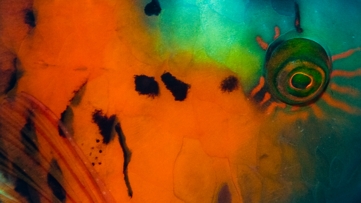
| Home |
| Colors of the Reef |
| Search the Reef |
| Science and the Reef |
| Equipment |
| New |
| Links |
| Contact |
| Interna |
The Coral Reef – Why there is no Equilibrium in a Living System
Pollution, global warming, and overfishing threaten the coral reefs all over the world. Disturbing the “equilibrium” of an ecosystem like a coral reef leads to its collapse or at least to irreversible changes. But why are these systems so sensitive to small environmental changes like increasing the water temperature by 2°C ?
The answer is that living systems like the coral reef ecosystem are actually far away from any equilibrium. So, what is scientific definition of the term “equilibrium”? This is understood best with an example. Take a closed bottle that is partially filled with water. At room temperature you find inside the bottle liquid water and a small amount of water vapor in the gas phase (which mostly consists of air). Water is all the time evaporating and condensing, but the amount of water evaporating and condensing is exactly the same. This is called an equilibrium between the liquid phase and the gas phase. What happens if you disturb the equilibrium by warming the bottle by 2°C ? A little bit more water will evaporate and the pressure in the bottle will slightly increase. But the increased pressure will lead to more condensation and we will get a new, only slightly changed equilibrium. In terms of the absolute temperature scale (starting at absolute zero at -273.15°C) a temperature change of 2°C at room temperature is less than 1% change, and thus only a small perturbation of the equilibrium.
What is the difference to a living system like a coral reef? The fundamental difference is that a living system needs a constant flow of energy and matter (food, light, water etc.) to keep alive. In a closed system, such as the bottle mentioned above, live is not possible. Just compare with an aquarium, which needs constant maintenance, support with oxygen, food etc. Even our planet earth is not a closed system in equilibrium, since we completely depend on a steady flow of energy from the sun. That means, living systems are far away from any equilibrium and a term that is better suited to describe it is “steady state”.
 Why does the difference between steady state and equilibrium matter? If you would send the bottle of water in a spaceship on a journey for 1000 years it would still be the same. However, the aquarium would be different even if perfectly maintained. There would be many generations of new fish and microorganisms, not at all the same as at the beginning. Moreover, evolution would slowly change the behavior and properties of the living organisms.
Why does the difference between steady state and equilibrium matter? If you would send the bottle of water in a spaceship on a journey for 1000 years it would still be the same. However, the aquarium would be different even if perfectly maintained. There would be many generations of new fish and microorganisms, not at all the same as at the beginning. Moreover, evolution would slowly change the behavior and properties of the living organisms.
Unlike an equilibrium state, a steady state is very sensitive to small changes of the environment. Small environmental changes can be dramatically amplified, since the parameters depend on each other not in a linear way but rather exponentially or even hyperbolically. That makes it also very difficult to predict the results of environmental changes (just think about the discussions concerning the effects of global warming).
Coral reefs are sensitive to small changes of the environment because they are not in equilibrium. A tiny variation (increase of temperature, invasion by an alien species such as the lionfish in the Caribbean, change of the nutrition by pollution) might induce a chain of changes (e. g. disappearing of species that are important in the food chain) that ultimately lead to a complete collapse of the system.

